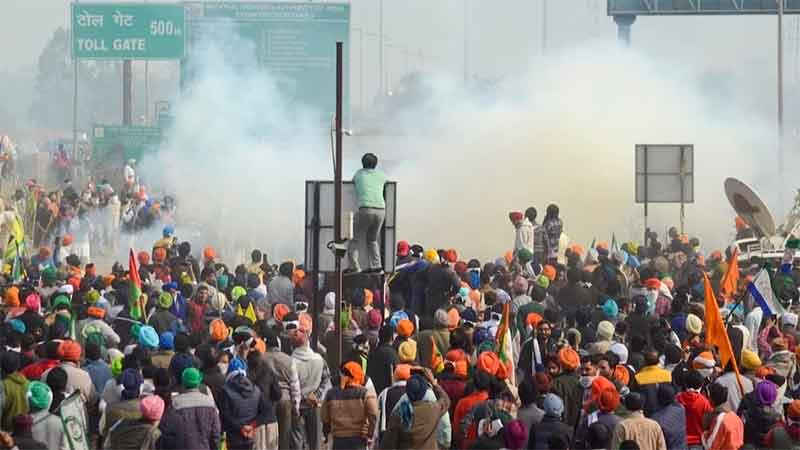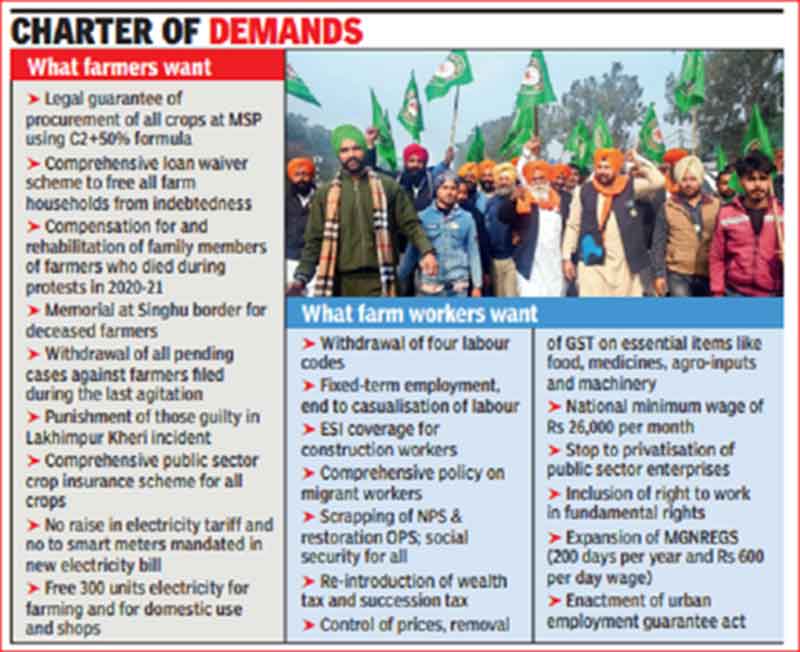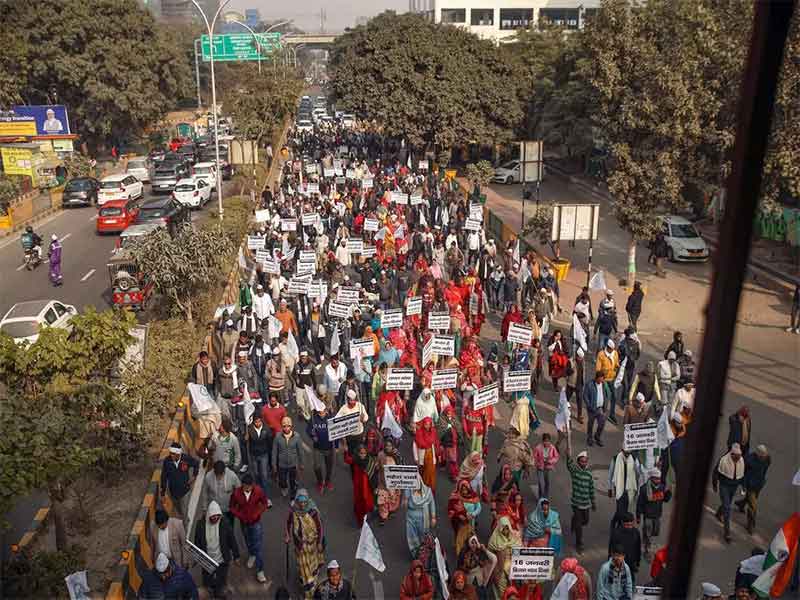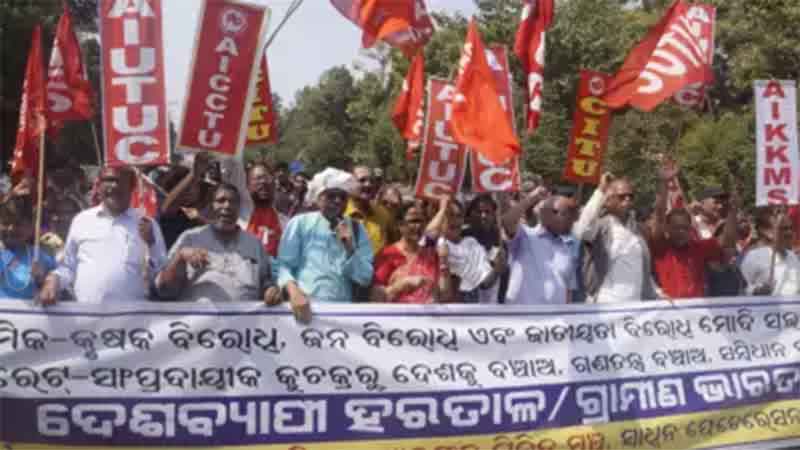
The renewed protests by farmers at the borders of Delhi have been met with a ferocious response by the State, showing yet again that dissent and self-determination of political identity are completely unacceptable to the Indian regime that has wholly given over every aspect of national life to ‘market forces’ (i.e., capitalists). The three ‘farm laws’ that were passed in 2020 and then withdrawn in 2021 were an attempt by the government to ‘liberalize’ the agricultural sector and make it open to the ‘free market’. These laws would have allowed private companies to buy ‘directly’ from farmers, entrap them in exploitative contract farming (echoing the way that the British colonial regime used to force farmers to grow indigo under the ryotwari system), and engage in price gouging and hoarding by removing stocking limits on agricultural produce. These laws were meant to weaken the bargaining power of farmers against multinationals with unlimited monetary and legal resources and accelerated the pitiable conditions of farmers already struggling to survive in their occupation, hastening their exit from the sector and leaving it open to being captured by capitalists.
Farmers’ demands and struggles vs. apathy of metropolitan elites
The farmers who are protesting at the gates of the capital city are chiefly demanding that the government enshrine a legal guarantee for Minimum Support Price (MSP), like legal guarantees of work (NREGA), education (RTE), and food security (NFSA). They also want:
· MSP by C2+50% formula recommended by the Swaminathan Commission
· Full debt waivers to farmers and farm labourers
· Land acquisition at 4 times the collector rate under Land Acquisition Act, 2013
· 200 instead of 100 days guarantee of work under NREGA
· India’s withdrawal from WTO
Political activist and commentator Yogendra Yadav, who has been prominent in farmers’ movements, has addressed all the key talking points around the farmers’ demand for legally guaranteed MSP here and here. The legal guarantee of MSP (minimum support price) is an unfulfilled demand from the 2020-21 agitation that was swept under the rug for nine months after it was called off. Then, a committee was announced in July 2022, which has not produced even a single report yet. And now, we have the government trying to force the farmers to give up this demand by stalling talks on one hand and relying on the media to create negative perceptions against the specific demand for MSP and the agitation in general.
The heavy-handed response to peaceful mobilization shows yet again that the government sees popular movements as de-facto threats and treats the masses as proprietary bodies that should only be rallied when it needs them and not otherwise. Its tone and approach remain as confrontational as ever, even though the rancid atmosphere it created during the first wave of farmers’ agitation led to the Lakhimpur Kheri murder of protesting farmers other than numerous cases of police violence. Upwards of 700 farmers died during the protests and the government claimed to not have a tally of the death toll.
The government also blocked 177 social media accounts that were pro-farmer and provided information and narratives against the grain of the State. Such internet censorship has become alarmingly normal in India and shows that the regime’s political interests can be flimsily dressed up as a ‘public order’ or ‘national security’ issue without much resistance. This makes it difficult for observers and journalists to get the farmers’ side of the story, know their demands, etc. while making it easier for regime propaganda to fill the vacuum with half-truths and hostile discourses.
Against this background, the social group that is most vocal against the demands of the farmers are the self-proclaimed ‘middle classes’, who are mostly urban-based salaried employees completely divorced from the agricultural sector except as retail consumers. This is the group that is most likely to complain about traffic jams due to the protests or denigrate the farmers’ demands by saying that they are not representative enough, that MSP will cost too much (with the underlying false belief that ‘only we pay taxes’), or repeat the lie that it is a tantrum by ‘rich farmers’ instead of genuine demands in the face of systemic evisceration of the agricultural sector at the altar of the market. The behaviour of the metropolitan elite can be understood since this is the consumerist class that has enjoyed the benefits of liberalization and market reforms the most (riding on the back of public goods like education and government jobs in the pre-liberalization era) and is ideologically committed to conflating private interests with their flawed definition of ‘national interest’.
Farmers’ fight against neoliberalism, poverty, State violence
This article by Colin Todhunter on Countercurrents (May 2022) lays out the agenda of neoliberalism as it relates to India’s agricultural sector. It explains that the aftermath of India’s foreign exchange crisis led to significant interventions by global finance capital in its domestic policy. The push for agricultural ‘reform’ in the face of massive resistance by farmers themselves shows that it was not a demand from the ‘ground up’ but rather was an imposition from the ‘top down’: “…global corporations and financial institutions behind the legislation remain steadfast in seeking to secure what the laws aimed to bring about – the full-scale neoliberal marketisation of India’s agrifood sector, including the displacement of peasant farmers and independent, indigenous enterprises.”
The interview goes into how international (read, Western) financial institutions like the IMF and World Bank made India reduce public support for its agricultural sector and reduce its role to a mere “facilitator of private capital”. Now that the threat of the three ‘black laws’ has been staved off for the present moment, the government is resorting to machinations to get out of being legally bound to provide the bare minimum support to farmers.
The miserable conditions of farmers are well-known throughout the country, and they make up one of the most exploited sections of society, despite all the comments made by the middle class in bad taste about their flashy cars and tractors or even eating pizza (mirroring the gripe they have about ‘rich Dalits’ accessing reservations!). Agricultural expert Devinder Sharma has rightly pointed out that India’s focus has been on increasing farm productivity but not farmers’ welfare. The monthly agricultural household income in 2018-19 was Rs. 10,218 as per the government itself, based on the National Sample Survey Office’s (NSSO) ‘Situation Assessment of Agricultural Households and Land and Livestock Holding, 2019’ survey released in 2021. Farmers are turning to wage labour as their major source of income, showing the infeasibility of agriculture for the average farmer. The Economic Survey of 2016-17 stated that “The median agricultural incomes (as measured by income from cultivation, net of cost and unsold produce valued at local market rates) at about Rs. 19,250 in 2012-13 or about Rs. 1600 per month, are still meagre (NSS, 2012-13).”
A report from the IEG based on 2013 data found that “About 53.37% of farm households earn income lesser than poverty line income” and that 52% of farm households were indebted. The government talks about doubling farmers’ income only as rhetoric while the realities of rising input costs and unfair prices for their produce continue to squeeze them and precipitate crises like farmers’ suicides, which average 30 per day. Given these circumstances, it is justified for farmers to mobilize in defence of their rights. Visiting State violence upon them in the form of tear gas and pellet guns or threatening to cancel their passports by deploying facial recognition against protestors is completely unacceptable and dictatorial and all right-minded citizens need to lend their support on a common platform of resisting privatization, protection of civil liberties, and advancing the rights of the working class.
Arjun Banerjee is a writer and political commentator. He is a postgraduate in English literature from the University of Delhi. He writes about current events and culture













































